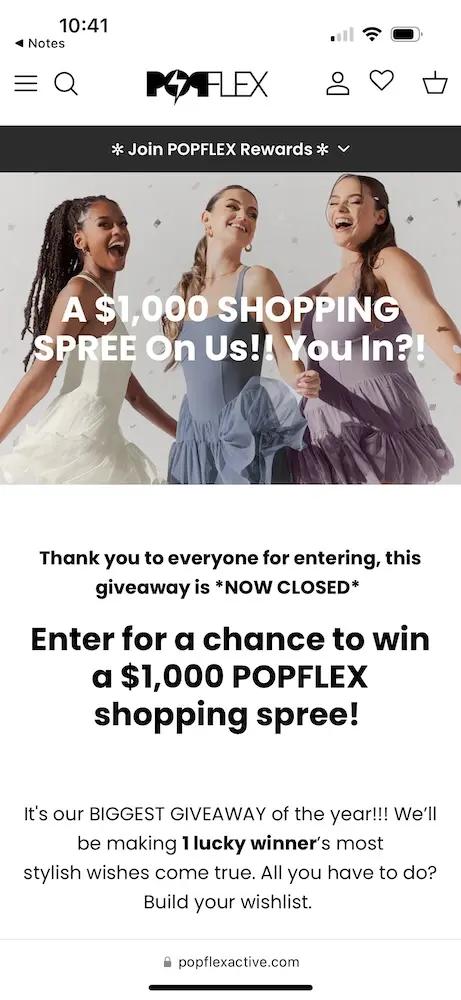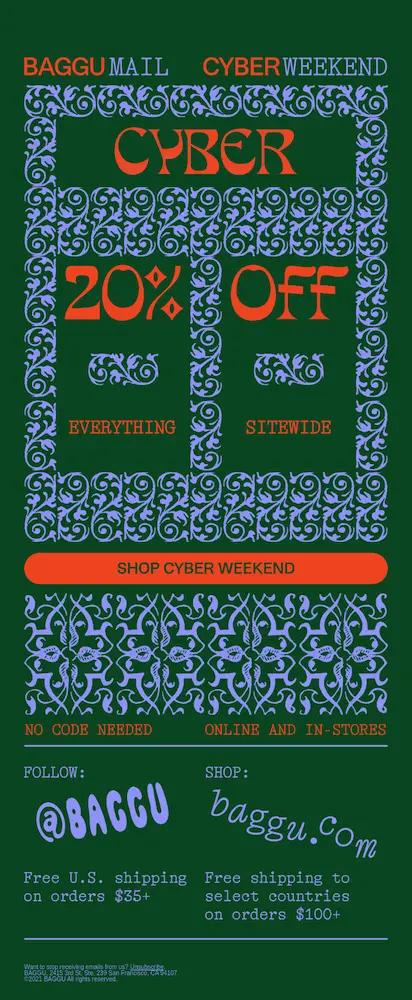If Black Friday isn’t already on your mind, it certainly should be.
So what’s standing between you and your biggest sales event ever?
At no other time of year are so many shoppers opening up their emails, texts, and wallets with such intent to buy.
Preparation.
The most successful brands lay the groundwork long before shoppers even think about Black Friday (BF). And you can start by understanding which BF tactics worked for them.
We looked at data from 169,000 global brands using Klaviyo for their Black Friday campaigns and found the brands that started sending campaigns in October and maintained a weekly cadence were about 3x more likely to be top-performing.
In other words, last-minute efforts just aren’t as effective. No big surprise there, but here’s what may not be as obvious: the ROI on your BF marketing hinges on what you do in Q3 and even earlier.
According to Vericast’s 2024 Retail TrendWatch, 44% of consumers plan to start shopping for the holiday in October or earlier. And the closer you get to BF, the more competition you’ll face from other brands.
With our data-backed Black Friday toolkit, you’ll be more prepared to use the time and tools you have at your disposal to set yourself up for success, starting right now. We recommend a phased approach to your preparations:
Optimise your forms and flows, and focus on building your lists.
Nail down your BF offer and develop the creative to make it impossible to pass up.
Execute and optimise your campaigns.
Phase 1: Optimise your forms and flows and grow your marketing lists
Before Q4, take these 3 steps:
1. Grow your marketing lists
It may seem obvious that adding more email and SMS subscribers means reaching more people with your BF campaigns. But many brands overlook this huge opportunity.
Skai’s Digital Marketing Trends Report found that quarterly spending from Q3 to Q4 2023 increased by 18% in retail media, 21% in paid social, and 27% in paid search, while cost per click and cost per mille also increased in paid search and paid social.
Since competition and ad costs are typically lower in Q3 than in Q4, it can be more cost-effective to drive owned marketing sign-ups with advertising in Q3.
Beyond advertising, try using sign-up form offers like early sale access, discounts, or other VIP rewards to boost email and SMS sign-ups from your website.
In 2023, for example, activewear brand POPFLEX hosted a giveaway in October that required entrants to create a holiday wishlist. The initiative drove nearly 100,000 entries, which included browsing and wishlist data the brand could use to personalise its holiday marketing.

And don’t underestimate the value of growing your SMS list. In 2023, leading brands using Klaviyo experienced at least 20% growth in SMS subscribers during Q4.
Shoppers don’t want to miss out on promotions from the brands they love, so let them know that SMS is an effective way to stay in the loop or get first dibs during the busy holiday season.
2. Optimise your forms
To ramp up your sign-ups in the lead-up to BF, we recommend using at least 2 sign-up forms on your site, including an embedded form and a pop-up form with a teaser.
Take the opportunity to A/B test your content or use AI to optimise your display timing. Our toolkit includes templates to help you work through your BF sign-up form strategy.
3. Finalise your flows
Black Friday isn’t just about making one-off sales—it’s about engaging customers and building brand loyalty.
Create and optimise automated emails and SMS message flows so you’re prepared to nurture an influx of new browsers and customers when the time comes. Aim for 8 or more flows, including:
- Welcome series
- Browse abandonment
- Cart abandonment
- Post-purchase
- Win-back
For larger brands, it can be worth adding more flows specifically for BF. Our research shows that top-performing large brands have 13 or more active flows in Q4.
Even if your strategy is focused more heavily on your marketing list than advertising, your customer acquisition cost will likely be higher than usual around BF—it’s a discount period, after all.
Your ultimate goal is to win long-term customers, so use your flows to create an exceptional customer experience and keep people coming back for more.
Phase 2: Determine your offer and create your campaigns
Early in Q4, take steps 4–7:
4. Identify your BF offer
This is a time when shoppers are hunting for deals, but higher discounts don’t always lead to higher conversions. Create an offer that entices customers, makes sense for your brand, and works for your bottom line. Get creative, think about what your target audience really wants, and use your own data to inform your decisions.
Your past campaign performance data is a helpful place to start. Take a look at your past promotions. Which offers performed best or worst? Can you find any patterns to help you understand why?
Consider your VIPs, too. Based on what you know about their shopping habits, can you create an offer just for them? This could be something like a gift with a purchase if your customers are looking for more value, not just discounts, or it could be a buy now, pay later offer.
5. Create your BF messaging and creative
An enticing offer is only part of the equation—you also need compelling creative to make it irresistible.
It’s safe to say everyone will be bombarded with marketing this holiday season, so make sure your campaigns a) grab attention instantly and b) make it easy to say yes.
This isn’t the time for complicated explanations, fine print, or extensive options. Keep your messaging clear and to the point so customers can click through and make a purchase in seconds.
In this example, bag brand Baggu makes it incredibly easy for shoppers with a sitewide discount, no code needed, and an accessible free shipping offer.

6. Test your content
Use A/B tests to experiment with different variations of your creative, from visuals and design elements to subject lines, copy, and CTA button placement. Simple things like copy length, voice and tone, or emojis can really make a difference.
Start with a hypothesis and test one variable with up to 4 variations at a time. Even small improvements can add up to significant revenue bumps around the holidays, so take advantage of the opportunity to boost your conversion rate.
7. Improve your email engagement rate
Check your sender reputation score and start warming your sender ID for deliverability. The higher your engagement rate, the less likely email providers will be to send your campaigns to spam, especially around high-volume seasonal sends. A personalised, segmented approach is key, and this doesn’t just apply to your BF campaigns.
Take a look at your email marketing strategy as a whole and find opportunities to clean your list, segment your flows and campaigns, or re-engage your most active profiles.
Phase 3: Execute and optimise your campaigns
Immediately before and during Black Friday, take steps 8–10:
8. Pause Smart Sending
Klaviyo’s Smart Sending feature caps the number of emails or texts any one person receives over a specific timeframe so your audience doesn’t get overwhelmed, especially if you have multiple flows running.
During BF, sending significantly more messages than usual is beneficial because buyer intent is high—so go ahead and pause Smart Sending for the campaigns you want everyone to receive.
9. Deploy your Black Friday campaigns
By the time BF rolls around, your audience should be primed, your campaigns should be teed up, and you should feel confident that all your planning and preparation is about to pay off.
Plan to monitor performance and optimise your campaigns and flows during this high-pressure weekend.
10. Adapt your strategy on the fly
Use your real-time insights from Black Friday to adjust your strategy for even higher conversion. If you find a tactic that’s working well on Black Friday, try weaving it into your January sale plans.
For example, if one of your Black Friday emails or texts performed better than the rest, try to recreate that success even beyond Black Friday. Look at factors such as timing, design, and messaging to build a hypothesis about what worked so well, then make adjustments to future campaigns as needed.
And don’t forget to keep an eye on your inventory. You don’t want to keep promoting a product that sold out in the first few hours, so be prepared to swap out your offers and creative if need be.
Tackle your Black Friday checklist starting now
With this 3-phase plan, you’re already positioned to win this Black Friday. All you have to do is put it into action, step by step.
Remember, first you need an audience to sell to. The more people you can get to opt into your list and start engaging with your brand, the more powerful your BF campaign will be. So begin there, and start as soon as you can.
Related content
- Make every message count: 10 Black Friday email examples
- Black Friday SMS marketing guide: 7 steps to success
- 10 digital BF tactics we already know customers love
Put these data-backed insights into action this Black Friday Cyber Monday.
Get the toolkit


